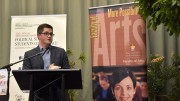I’ve been sliced, diced and poisoned, turned inside out and outside in. I’m missing innards and my outsides look like they’ve been to war — because they have.
The enemy’s name was osteogenic sarcoma, or as it’s been coined “Terry Fox cancer.” The plan of attack was a fully loaded chemotherapy regimen and extreme surgery to replace my knee and parts of my shin and femur. It’s been almost three years and the dust has settled. I’m cancer free and I never take that for granted. I’m in constant physiotherapy to get my leg to its best level of function and progress is slow but apparent.
I’m back on campus and I don’t think there’s any place I’d rather be, but now that I’m hitting the books again I’m presented with some unique challenges. Fortunately here at the University of Manitoba, Student Accessibility Services offers resources and positively charged advisors to help students like me who come across road-blocks on campus. I just recently had a meeting with an advisor and she got me so pumped that when I left her office, I wanted to take my crooked walk down the hall to the elevator, off campus and right up Everest.
There is however one thing I can’t stop thinking about since my first meeting. Everything Student Accessibility Services does for you is 100 per cent top secret. Every student you see there was never really there, if you get what I’m saying. My advisor warned me that if I bump into her on campus she wouldn’t be able to say hello unless I did first.
I guess for some people this is a relief, but personally it made me kind of sad. I understand that your personal information shouldn’t be public knowledge — or get posted in the Manitoban — against your will, but I can’t help but wonder if there are students who keep their disability private because they’re self-conscious. Why would they be self-conscious? Maybe because in our society accepting help means getting a label slapped on your forehead that reads “weak.”
I watched a video in my English literature class, where a woman spoke about physical disabilities. She mentioned that she’d seen people with severe disabilities struggling to get around campus on their own two feet instead of using a wheelchair. She said that it disturbed her and honestly it disturbs me too, because I’ve done the same thing. I know that when I refused to accept help it was out of fear of being viewed as “weak” or “disabled.”
When I first got diagnosed I was told that I couldn’t walk on my leg because the tumour had made my knee so brittle that it could break under the pressure; an amputation would then be necessary. I was devastated, and when the doctor suggested I not even walk down the hall to get crutches, I held my head high and walked right out the door.
That was one of the dumbest things I’ve ever done in my life. I risked losing my leg just because I refused to sit in a wheelchair for 30 seconds. I had a good reason though. I was I trying to prove that I was strong: “I am woman hear me roar! I risk my limbs for no good reason!”
Our society is concerned with being “normal,” as a result we are conditioned to fear “weakness” and “abnormalities.” If you can’t walk, you’re not “normal.” If you have a limp then you don’t walk “normally.” If you use Student Accessibility Services then you’re not a “normal” student, you’re a “disabled” student. This harmful notion of “normal” controls the way we act and the way we express ourselves in society every day; it’s the reason that some students, who are getting help to reach their goals, want you to pretend you don’t know them in the Tim Horton’s line.
I wrote this article because I wanted to communicate a message. I have spent a lot of time thinking about exactly how to express myself, and it turns out it’s pretty simple.
Here’s my top secret, private information. Stigma be gone!
My name is Stephanie Haderer and I am what society would call a person with a disability. I use Student Accessibility Services, formerly known as disability services, and yes, I have a handicap parking pass that my able bodied peers should envy. I believe accepting help to reach goals is just another step in the journey toward graduation and the only thing that should be swept under the rug is the idea of what’s “normal” and what’s not. I fully respect other students’ right to privacy, but if you see me in the Accessibility office, feel free to say hello when we meet again!




